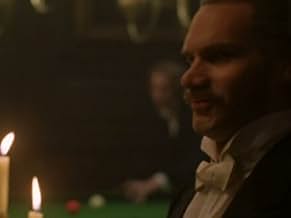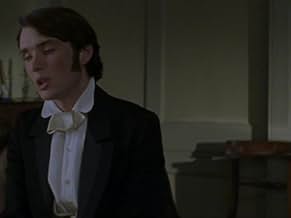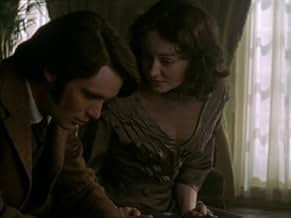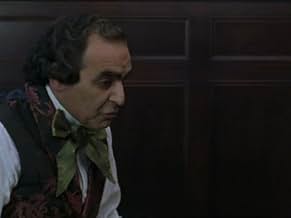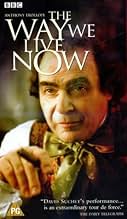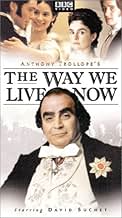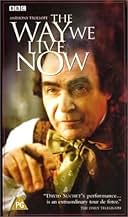Füge eine Handlung in deiner Sprache hinzuAugustus Melmotte is a European-born city financier whose background is as mysterious as his business. Only weeks after his arrival in London, he announced a new venture and promises instant... Alles lesenAugustus Melmotte is a European-born city financier whose background is as mysterious as his business. Only weeks after his arrival in London, he announced a new venture and promises instant fortune.Augustus Melmotte is a European-born city financier whose background is as mysterious as his business. Only weeks after his arrival in London, he announced a new venture and promises instant fortune.
- 3 BAFTA Awards gewonnen
- 7 Gewinne & 12 Nominierungen insgesamt
Empfohlene Bewertungen
Trollope weaves the strands of the plot adroitly using the Carbury family as the central characters. Lady Carbury (Cheryl Campbell) is the widow of a baronet (minor aristocracy) and without the means to live in the appropriate style. Her son Felix (Matthew McFadyen) is a total waster, putting any money he gets on the card table, and losing it. Lady C is trying to palm her rather priggish daughter Hetta (Paloma Baeza) off onto her nephew Roger (Douglas Hogg), also a prig, who has inherited the family estates. Roger is interested but Hetta is not, as she fancies Paul Montague (Cillian Murphy), a railway engineer and friend of Roger's. Murphy works for Melmott's company (the board is stacked with peers and baronets, including Felix). The Central American railway is supposed to be building a railroad from the central west of the US to Mexico. The railroad route has been surveyed, but funnily enough construction keeps on being delayed even though enough money has been raised to at least start it. Where's the money Melmott? Some is syphoned into his daughter Marie's trust fund. Marie (Shirley Henderson) is courted by Felix, who is very interested in the money, though not so interested in Marie.
To say more would spoil the story. The casting is splendid, except for Cillian Murphy as Paul whose pretty-boy looks are more appropriate for a Romeo than some who has been a civil engineer for some years and spent a lot of that time in the merciless Mexican sun. As his American mistress Mrs Hurtle, Miranda Otto, otherwise a capable actress, can't do the Deep South accent. It would have been better to re-write the part for an Australian. If it's any consolation, Meryl Streep can't do an Australian accent either it comes out as cockney, as we saw in 'Evil Angels'.
The star performance is without a doubt David Suchet's as Melmott. Though a small man, he dominates every scene he is in, with his deep loud voice and grand manner. Critics are silenced by a mixture of flattery, bluff and sometimes threat. In the finish we almost like him, despite the chaos he causes. It is truly the role David Suchet was born to play, one utterly different from his small fussy Belgian detective, Hercule Poirot. Shirley Henderson as Marie also stands out in this company of very accomplished acting.
I haven't checked the novel, but there are one or two quite modern touches for which Trollope may have been responsible, such as Marie's (or was it Hetta's?) feminist speech towards the end. He may have got that from his mum, who had to support her family by novel-writing after her husband died, and did so quite successfully.
In the 1870s we had railways, in the 2000s we had dot coms. The vehicles change but we still have fear and greed as dominant players in the markets. The title 'The Way We Live Now' is just as apt today, as we see the Enron, Arthur Andersen, Worldcom crashes in the US, and HIH, FAI and One-tel in Australia. It is interesting that this 1875 novel, with no high literary pretensions, pulp fiction in fact, should be so relevant today. A engrossing film adaption from the Eng Lit specialists.
Taking this mini-series as an adaptation, it is not hard to see why it would disappoint. It's very condensed and also exaggerated, and it's also not as rich with not quite enough of the topical matters of the time explored in depth. The characters are still interesting (characters driven by greed preparing for a heavy hall which happens) and entertaining and the story fully absorbing with the subplots nicely fleshed out, just that it pales in comparison to the book.
In all honesty however, because of being so heavy and rich in detail and for its length, the book is very difficult to adapt (almost as difficult to adapt as Stephen King, Fyodor Dostoevsky and Leo Tolstoy) and, regardless of how disappointing it is in comparison, the 'The Way We Live Now' mini-series does laudably and is a solid and even very good to great mini-series on its own.
Of course there are things that stop it from living up to its even stronger potential, and forgive me if the flaws that have been covered in previous reviews are repeated (or shall we say somewhat parroted). Those flaws are the ending and two miscasts, while the many strengths far outweigh them they are big and jarring enough to not ignore. The ending is rushed and doesn't feel that well rounded off.
Cillian Murphy has shown considerable talent over the years, but here he's too delicate-looking, too young and rather effeminate and earnest. He doesn't convince as an engineer and doesn't fit the period either. Miranda Otto is strange and not in a good way. She plays her already pretty dumbed down character as a broad and annoying caricature and even more painfully attempts a Southern accent (and badly doesn't describe it, it's one of the all-time worst attempts at an accent to me) that sounds so overdone and so obviously fake with a bored-sounding drawl to match.
Luckily the rest of the cast more than make up for them. David Suchet dominates, playing a loathsome yet still fascinating character to gleeful perfection, a contender for his best non-Poirot performance. Shirley Henderson plays her emotional-roller-coaster-filled character very passionately and movingly, and Matthew MacFadyen is clearly enjoying himself as a cad but brings enough charm to make one believe how easy he is to fall for.
Douglas Hodge gives his very conflicted role a real humanity and Paloma Baeza has a slightly underwritten character but plays her with plenty of fire and intensity. Anne Marie Duff allows one to sympathise with her while also reminding us of how she is no much better than those who have shunned her, while Jim Carter brings much joy in a wonderful performance that has gone under-appreciated. Allan Corduner is spirited though a little more wit wouldn't go amiss and Cheryl Campbell is her usual dependable self.
'The Way We Live Now' looks fantastic, with evocative scenery, interiors, buildings and costumes that are striking on the eyes all captured perfectly by photography that is both atmospheric and luminous. The music score could not have been a better fit and also a fine score on its own, while there are some delicious bits of humour in the script with the satirical elements sharp and gleefully exaggerated at times and leaving enough room for insight. The storytelling is absorbing and compelling throughout the length, everything being easy to follow without being simplistic or over-complicated, and the characters are intriguing and enjoyable if with more meat to them in the source material.
Overall, very good mini-series that had the potential of being even stronger. 8/10 Bethany Cox
The acting is at it's very best, and my attention again goes to David Suchet in particular, because he kept amazing me every time I saw him on screen in the role of Augustus Melmotte, I can't find the words to say how perfect his acting is. Not much actors get close to perfection... but David Suchet most certainly does.
Matthew MadFadyen, Cillian Murphy, Miranda Otto and a whole range of other actors also deserve to be praised. Just as the brilliant David Yates and the memorable music of Nicholas Hooper.
If you have never seen this series, don't hesitate for a moment and buy it on DVD. I'm sure you will agree with me ;) .
Wusstest du schon
- WissenswertesMrs. Hurtle indicates that the year is 1870. Trollope did his homework creating the fictional railroad enterprise. In 1870 Salt Lake City had almost three times the population of either Los Angeles or Denver, benefiting from the post-Civil War expansion westward and the booming silver and copper mines in the Intermountain West. Also by 1870 Salt Lake City was connected by rail to the Union Pacific Railroad and other smaller regional lines connecting to the mines. Building a railroad to haul ore from the US Rockies to a Mexican seaport on the Gulf of Mexico and to return with goods, supplies, and homesteaders made commercial sense and could easily have been supported in principle by a US Congress governed by America's Manifest Destiny.
- Zitate
Sir Felix Carbury: I may not be possessed of great wealth or property, but I am a baronet and a gentleman.
Augustus Melmotte: And I'm not, you imply.
Sir Felix Carbury: No! No, that's not what I meant at all!
Augustus Melmotte: I think we understand each other very well. You're to provide the rank and position and I am to provide the money. That's the bargain. I buy my daughter a place in society by paying you to marry her.
- VerbindungenFeatured in The Two Loves of Anthony Trollope (2004)
Top-Auswahl
- How many seasons does The Way We Live Now have?Powered by Alexa
Details
- Erscheinungsdatum
- Herkunftsland
- Offizieller Standort
- Sprache
- Auch bekannt als
- Дороги, які ми вибираємо
- Drehorte
- Produktionsfirmen
- Weitere beteiligte Unternehmen bei IMDbPro anzeigen
- Laufzeit1 Stunde 15 Minuten
- Farbe
- Sound-Mix
- Seitenverhältnis
- 1.33 : 1

